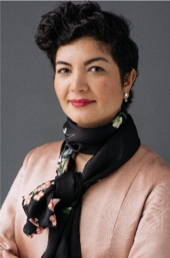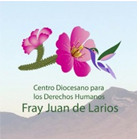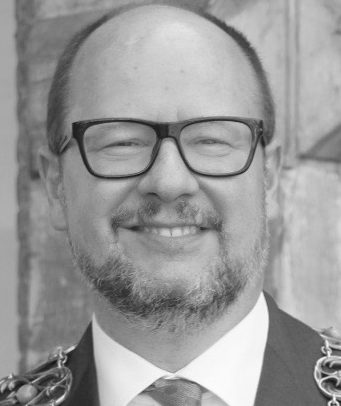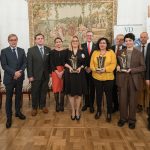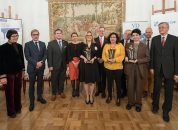
The Polish Sérgio Vieira de Mello Prize was established by the Villa Decius Association in 2003. It is awarded to individuals and non-governmental organizations for their efforts to promote peaceful coexistence and cooperation of societies, religions and cultures. On October 24, 2019, the 16th Award Ceremony took place.
The award is granted by the Chapter composed of High Representatives of the President of the Republic of Poland, Ambassador of the Federative Republic of Brazil to Poland, Ambassador of the Kingdom of Sweden to Poland, UN High Commissioner for Refugees, Minister of Foreign Affairs of the Republic of Poland, Ombudsman, Institute of National Remembrance, Prize Founders, Prize Initiators, Embassies, Consulates and Foundations supporting the Villa Decius Association’s activities in the field of human rights and representatives of the Association.
Laureates of the Polish Sérgio Vieira de Mello Prize receive a statuette by Andrzej Renes and a commemorative diploma. The award also has a financial dimension and is funded annually by Polish companies and enterprises.
The Laureates of the 16th edition of the Polish Sérgio Vieira de Mello Award, the UN High Commissioner for Human Rights, are:
Person:
Tamila Tasheva
Tamila Tasheva is a co-founder and the Chair of the Board of “CrimeaSOS” NGO is a human rights activist and one of leaders of the Crimean Tatar young generation. She is actively involved in IDPs issues, human rights situation in Crimea, advocacy activities and development of Ukrainian legislation in social protection and humanitarian law regarding the temporarily occupied territories. Tamila Tasheva has a wide experience in civil society sector. Before the annexation of Crimea, she successfully implemented a series of cultural and educational projects and civic initiatives promoting culture of the Crimean Tatar people and developing the civil society in Ukraine. She was i.a was a volunteer during Maidan. Tamila Tasheva is the co-founder of the Ukrainian grassroots civil society initiative CrimeaSOS which since 2014 has been an implementing partner of the United Nations High Commissioner for Refugees (UNHCR) programs related to the protection of IDPs in Belarus, Moldova and Ukraine.
NGO:
The Diocesan Human Rights Centre “Fray Juan de Larios” (CDDHFJ) was established in 2001 by the Bishop of the Saltillo Diocese, X. Raúl Vera López, a priest of the Dominican Order. For almost a decade now, we have focused on issues related to enforced disappearance.
Since 2009, following a wave of violence in Northern Mexico, especially in Coahuila State, an increasing number of mothers looking for their missing children started to come to CDDHFJL, asking, for example, for legal advice.
Relatives of missing persons were advised to form a group named Fuerzas Unidas por Nuestros Desaparecidos en Coahuila (FUUNDEC-FUNDEM). CDDHFJL offered them companionship and consulting on legal matters, provided psychological and organisational support in dialogue with authorities and on the political level it demanded justice and dialogue for the purpose of immediate search for the missing, creation and implementation of the relevant investigation procedures, implementation of the federal scheme to provide aid to the relatives of missing persons and respect of UN recommendations by the Mexican state.
The Centre is also actively involved in activities for human rights education, it shares and transfers experience and knowledge on the culture of respecting human rights with local communities and throughout the country, and it organises workshops on the topic.
Blanca Martinez is the head of CDDHFJL based in Saltillo, Coahuila. Raúl Vera López, OP, bishop of the Saltillo Diocese, is the president of the association.
Blanca Martinez’s speech at the award ceremony: link
Honorary Prize:
Paweł Adamowicz
“My name is Paweł Adamowicz. I have the honour of holding a title of Mayor of Gdańsk, my beloved city of freedom and solidarity.” This is how the Mayor of Gdańsk introduced himself on his official website. On Sunday, 13 January 2019, he was assassinated during the final gala of the Great Orchestra of Christmas Charity. He was 54 years old, beginning the twenty-first year of his office as Mayor of Gdańsk.
Paweł Adamowicz studied law at the Uniwersity of Gdańsk. During the 1988 Solidarity strike of students of the University of Gdańsk, he was in charge of the Student Strike Committee. From the very beginning he participated in the birth of self-governance and transformation of Poland’s political system.
He became mayor of Gdańsk for the first time at the age of 33. In the first direct election to the office, he won 72% support of voters (in run-off voting).
During his most recent, sixth victorious election campaign he said: “When running this election campaign, the most intense one of all those I participated in, when meeting local residents in the streets and visiting their homes, I discovered again that democracy is about bonds between people.”
The development of the Immigrant Integration Model, a pioneer project in Poland, and the establishment of the Council of Immigrants were some of Paweł Adamowicz’s numerous achievements while he held the office of the Mayor of Gdańsk. The Model for Equal Treatment, as a weapon against all signs of discrimination in Gdańsk, is to be implemented in Gdańsk soon.
He believed in the special mission of Gdańsk as a city of freedom and solidarity. “These two concepts reflect the spirit of our city well. Gdańsk proved the importance of freedom and democracy many times – in 1970, in 1980, in 1989 and at the present moment. For this reason, I have always built and supported processes aimed at developing a civic society in our part of Europe, in particular in the countries of the Eastern Partnership,” he wrote on his website.
We cordially invite you to watch the photo report from the Prize Ceremony!
(photo: Paweł Mazur)
Sponsorzy/Sponsors:





